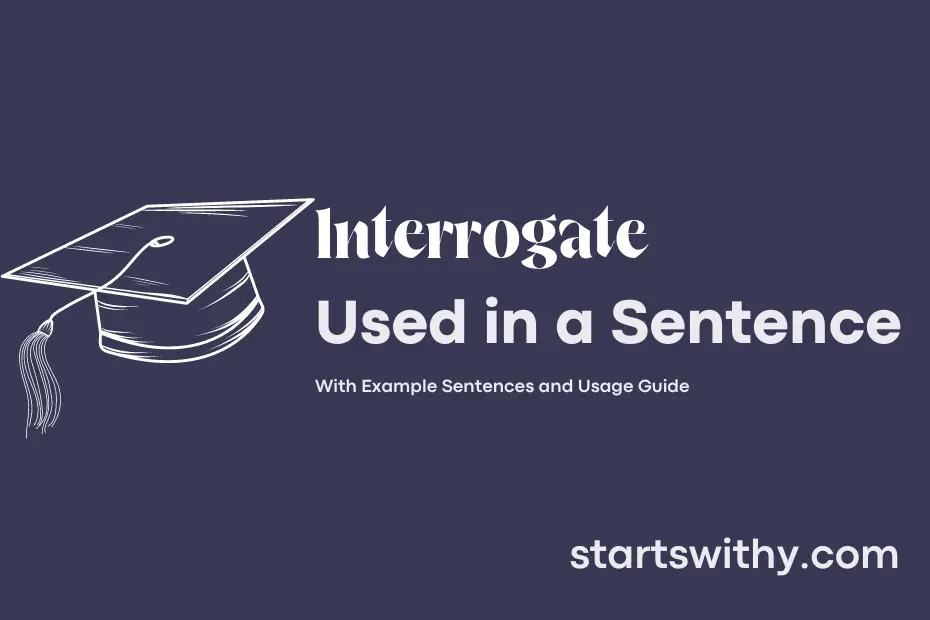Do you ever wonder about the best ways to extract information from someone during an intense questioning session? This is where the art of interrogation comes into play.
Interrogation is a systematic questioning technique used to gather crucial information from individuals. By employing various tactics and strategies, interrogators aim to elicit truthful responses from their subjects while navigating through potential deception.
7 Examples Of Interrogate Used In a Sentence For Kids
- Interrogate means to ask a lot of questions.
- When you interrogate someone, you want to know more.
- It’s important to interrogate before making a decision.
- Police officers often interrogate witnesses to solve crimes.
- You can interrogate your friends to learn more about them.
- Teachers may interrogate students to see if they understand a lesson.
- Remember to be polite when you interrogate someone.
14 Sentences with Interrogate Examples
- Interrogate the text to find the main themes and motifs.
- Have you prepared questions to interrogate the guest speaker during the seminar?
- It’s important to interrogate the data before drawing any conclusions.
- How can we effectively interrogate the sources for our research project?
- Interrogate the experiment results to identify any anomalies or errors.
- The detective had to interrogate multiple suspects to solve the case.
- Remember to interrogate the author’s bias when analyzing the article.
- Can you help me interrogate the validity of these survey results?
- Interrogate the assumptions underlying the theory to deepen your understanding.
- Students should feel comfortable to interrogate the lecturer’s arguments during class discussions.
- Let’s interrogate the impact of globalization on local economies.
- Before making a decision, it’s crucial to interrogate your own beliefs and values.
- Interrogate the historical context of the literature you are studying.
- Don’t be afraid to interrogate the societal norms that influence your thinking.
How To Use Interrogate in Sentences?
To use the word Interrogate in a sentence, first, identify a situation where you want to question someone closely or thoroughly. For example, in a police investigation, a detective might need to interrogate a suspect to gather information about a crime.
Next, formulate a sentence that includes the word Interrogate in the appropriate context. For instance, “The detective decided to interrogate the witness to uncover more details about the incident.”
Make sure that the sentence is grammatically correct, and the word Interrogate is used in the correct tense based on the context. It is important to understand that Interrogate is typically used when referring to a formal questioning process, especially in legal or investigative settings.
Additionally, when using Interrogate in a sentence, consider the tone and formality of the situation. Using it in a serious or professional context is more appropriate than in casual conversations.
Lastly, practice using the word Interrogate in different sentences to become more confident with its usage. This will help you effectively incorporate it into your vocabulary and communicate more clearly in various situations where thorough questioning is involved.
Conclusion
In conclusion, sentences that interrogate are characterized by their questioning nature, seeking to gather information, clarify doubts, or challenge assumptions. These sentences often start with words like “who,” “what,” “when,” “where,” “why,” and “how,” prompting a response or prompting deeper reflection on a certain topic. By using interrogative sentences, speakers can engage in conversation, explore ideas, and stimulate critical thinking.
Interrogating sentences can be powerful tools in communication, encouraging dialogue, uncovering insights, and fostering a deeper understanding of a subject. Whether used in academic writing, interviews, debates, or everyday conversations, sentences that interrogate play a vital role in driving inquiry, sparking curiosity, and advancing knowledge.



